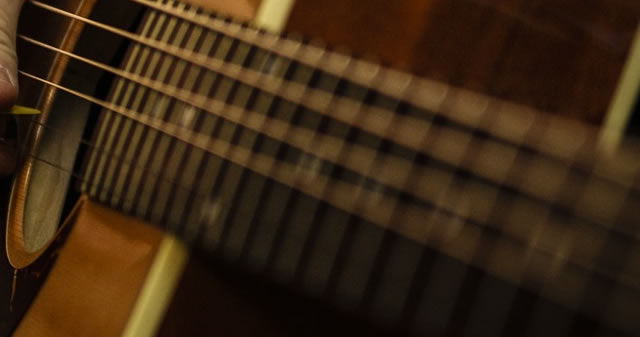Click here for your FULL 167-chord Alt Tuning Chord Chart – only $1.99 each!
Click here to download and print your FREE 36-chord Alt Tuning Chord Chart – DACFCF “Open Dm7” in F Major.
Today is alt tuning #3 since starting on January 1, 2016. My open string notes are:
DACFCF
In our first blog post, we looked at DADGAD tuning. In yesterday’s post, we explored DADF#AD (Open D) tuning, changing the open note G on string 3 in DADGAD tuning and lowering that note a half-step to F#. This change from G to F# changes the open chord from D sus to D Major.
Today, we’re going to take alternate tuning a step further by changing the tuning on 5 strings. We’ll also change keys from D Major to F Major.
Let’s look at our new tuning: DACFCF in the key of F Major.
- String 6: D (whole step down from standard tuning E)
- String 5: A (stays the same as standard tuning A)
- String 4: C (whole step down from standard tuning D)
- String 3: F (whole step down from standard tuning G)
- String 2: C (half step up from standard tuning B)
- String 1: F (half step up from standard tuning E)
In the video below, I’m playing a song called “Breaking Bread” written in this tuning. After the video, I’ll give detailed instructions and screenshots of some of the really nice chords you’ll hear.
Let’s check out the first chord I play, F M7 (Major 7):

One reason I like this tuning so much is that not only are strings 1-5 open, but the notes of F M7 are close together – making it easy to get your fingers on all the chord notes.
My favorite finger position is:
- String 6 – Fret 3 (F)
- String 5 – Fret 3 (C)
- String 4 – Fret 4 (E)
- String 3 – Fret 4 (A)
- String 2 – Open (C)
- String 1 – Open (F)
This is a nice, full F M7 with the low F that gives the chord strength but includes the open strings 1 and 2 which give the chord a vibrant, open sound.
Our next chord is A# M7 and uses the same fingering as F M7 in DACFCF tuning:

When you play F M7 and A# M7 as a progression, you can keep your fingers in the same position as you play one chord and then the next. I like to “slide” into the chords as you saw and heard in the video example at the top of this page.
The next chord in my example progression requires barring your finger across all 6 strings on fret 7 to play the A m7 (Minor 7) chord:

While you’re barring the 7th fret, you can also play the A notes on string 4/fret 9 and string 2/fret 9 as a variation of the A m7 chord. When I play the open strings (strings 5, 4 and 2) and play string 6/fret 2 (E), string 3/fret 2 (G) and string 1/fret 2 (G), although I’m playing all the notes in the A m7 chord, it has a strong “E” sound because E is the lowest note of the chord (the root of the chord). It’s “in” but for my progression, I chose barring across the 7th fret.
For the last chord of my progression, I keep my finger barred across the fretboard but slide down to fret 5 to play the G m7 chord:

One of the reasons I like this finger position so much is the way I can transition from G m7 back to the first chord in my progression, F M7. It’s easy on the fingers but the chord voicings work really well together.
With this finger position (barring fret 5), you can also play the G notes on string 4/fret 7 and string 2/fret 7 as a variation of the G m7 chord.
May these daily alt tunings continue to inspire you as you explore songwriting beyond the limitations of standard tuning. If you’d like to learn more about making alt tuning a part of your songwriting, give me a call at 888-7-GUITAR or reach out to me here.
Until next time…
~Scott Quillin
Did you know? Scott started playing guitar when he was 14 years old back in 1982. A Pittsburgh native, Scott resides in Rhode Island where he teaches guitar, bass, music and songwriting. He also records and mixes songs for local bands and artists as well as his own music. He writes and records nearly every day and has a real passion to help others hear their “inner voice” and express that in songs.
You can listen to more of Scott’s music at https://soundcloud.com/scottquillin.













3 thoughts on “DACFCF Tuning – Key of F Major”
Pingback: DACFCD Tuning – Key of F Major - AltTunings.com
Pingback: FACFCD Tuning – Key of F Major - AltTunings.com
Pingback: DACFCD Tuning – Key of F Major – AltTunings.com